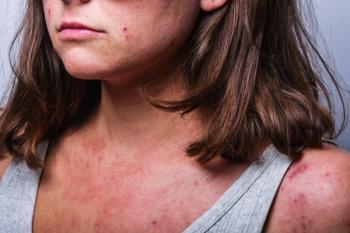
Apremilast demonstrates safety, efficacy in phase 3 trial for psoriasis in pediatric patients
It was recently announced that oral Otezla is efficient in treating pediatric patients with moderate to severe plaque psoriasis.
Amgen recently presented the results from 2 phase 3 trials on oral apremilast (Otezla; Amgen) at the 2022 European Academy of Dermatology and Venerology, which demonstrated efficacy in treating moderate to severe plaque psoriasis in children and moderate to severe genital psoriasis in adults.
Safety and efficacy in pediatric patients aged 6 to 17 years were proven in the SPROUT study, which saw a 33.1% static Physician's Global Assessment (sPGA) score for apremilast at week 16 compared to 11.5% for placebo. There was also a greater number of patients reaching a 75% or more reduction in the Psoriasis Area and Severity Index for apremilast vs placebo.
Adverse events included diarrhea and nausea at approximately 20% each, abdominal pain at about 19%, vomiting at about 18%, headache at about 10%, pyrexia at about 7%, nasopharyngitis at about 6% and upper abdominal pain at over 5%. These were the expected adverse events for apremilast based on its safety profile.
"With more than 700,000 patients treated worldwide, the data from SPROUT and DISCREET add to the robust safety and efficacy data on Otezla and furthers our understanding of how Otezla works in patient populations where there remains a high unmet need," said David M. Reese, MD, executive vice president of Research and Development at Amgen. “These data are greatly encouraging for those adults and children who currently have limited options.”
Reference
Amgen announces positive new data at EADV 2022 for Otezla (Apremilast). PR Newswire. September 8, 2022. Accessed September 9, 2022.
Newsletter
Access practical, evidence-based guidance to support better care for our youngest patients. Join our email list for the latest clinical updates.






